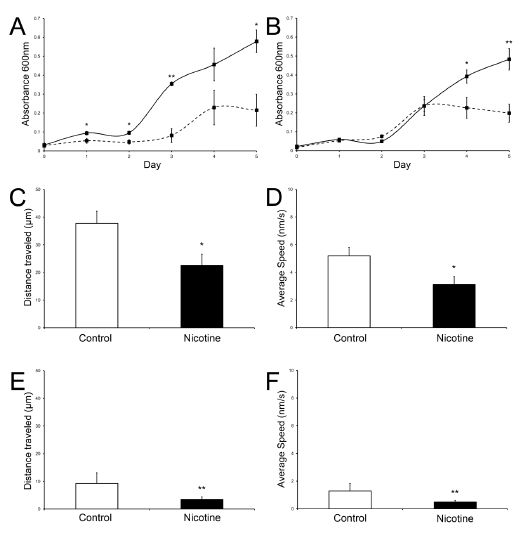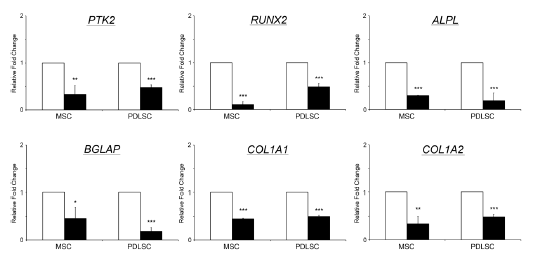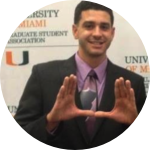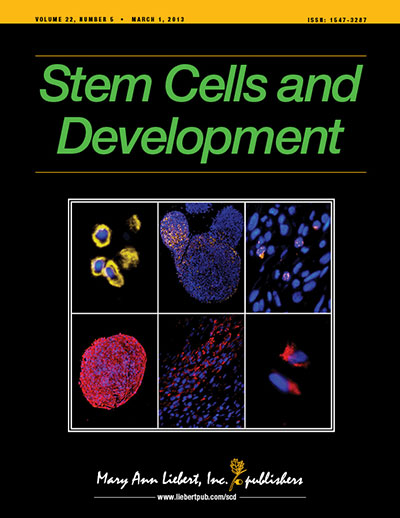About This Project
Electronic cigarettes (e-cigs) expose users to concentrated doses of nicotine with each puff. Although said to be a safe alternative to smoking, nicotine alone can effect stem cell function- a process critical for tissue maintenance/regeneration and overall health. In order to understand how these effects may influence one's health and potential for future cell therapies, we must first understand the unknown mechanisms behind nicotine's action.
Ask the Scientists
Join The DiscussionWhat is the context of this research?
Nicotine, a naturally occurring chemical found in tobacco leaves, is the main ingredient in e-cigs. Research shows that nicotine can affect many parts of the body. Our lab has shown that nicotine can go as far as affecting stem cell health and function. When exposed to nicotine, stem cells had a significant reduction in their natural ability to transform into various tissues like bone and heart.Researchers have recently identified nicotine-binding receptors on the surface of various stem cell populations. Typically, nicotine activates these receptors initiating a downstream chemical effect. The downstream effect has numerous implications on cellular function, including but not limited to: proliferation, migration and differentiation.
What is the significance of this project?
Nicotine is present in cigarettes, the leading cost of preventable death worldwide, and in e-cigs. The use of e-cigs is rapidly increasing, yet the FDA has no current regulation over these devices. As a result, there are no federal tests and guidelines to ensure their safe use. Concentrated doses of nicotine have been shown to significantly alter stem cell function; however, the mechanism behind these effects remains unknown! Stem cells are essential to one's health as they play a critical role in recreating tissues after traumatic injuries like heart attacks. Patients exposed to such doses are therefore at a higher risk for issues such as delays in wound healing. Understanding nicotine's pathway can therefore allow us to reverse engineer treatments to combat such negative effects.
What are the goals of the project?
The main goal of these experiments is to determine the effect nicotine and specific receptor blockers have on a stem cell's function. Specifically the goal of performing these experiments is to determine the effect on the proliferation, migration, and cardiac differentiation potential of our stem cell population. We will confirm these effects via a variety of experiments, including but not limited to:
- MTT Analysis
- Migration Assays
- Immunocytochemistry
- RNA Isolation
- Reverse Transcription
- Real Time-Polymerase Chain Reactions
Budget
Growth Factors
Stem cell differentiation is a necessary component of our study. Differentiation can be achieved by supplementing culture media with growth factors. By differentiating our cells in the presence of nicotine and nAChRs blockers we can begin to understand how nAChRs may influence the function and health of our human stem cells.
Primers
Primers that bind to cardiac genes are needed in order to evaluate the extent of cardiac differentiation caused by nicotine and receptor blockers.
Antibodies
In order to confirm the results of the gene expression studies, immunocytochemistry is necessary. Antibodies will be used to localize specific structural and nuclear proteins associated with fully differentiated cardiac cells.
Common Culture Supplies
These supplies are essential in the maintenance of our stem cell cultures. Supplies include: media, culture plates, pipettes, tubes, gloves, etc.
Note: Budgeted amounts account for enough materials to conduct and repeat experiments.
Meet the Team
Team Bio
Carlos M. Carballosa is a biomedical engineering PhD graduate student at the University of Miami. As a biomedical engineer, Carlos has focused on tissue regeneration and is currently investigating the role nicotine and nicotinic acetylcholine receptors play on adult stem cell function.Dr. Herman Cheung received his PhD in Molecular Biology from USC and is currently the James L. Knight Professor of Biomedical Engineering at the University of Miami. He also holds the highly prestigious rank of the Senior Veteran Affairs Research Career Scientist at the Miami Veteran Affair Medical Center at Miami, Florida. Dr. Cheung has a wide range of expertise in the regenerative medicine and is considered a renowned scientist in fields like osteo- and chondro-tissue regeneration. You can see his faculty page here.
Carlos M. Carballosa
A true Miami Hurricane through and through, Carlos Carballosa has spent the majority of his collegiate career at the University of Miami studying the effects of nicotine on adult stem cell biology and tissue regeneration. After obtaining his Bachelor's of Science in Biomedical Engineering from the University of Miami, Carlos enrolled in the University's Masters Program and shortly thereafter completed his thesis titled: The Effects of Nicotine on Mesenchymal Stem Cell Function. Carlos continues to be passionate about his field of study and is currently enrolled in the Biomedical Engineering Doctoral Program at the University of Miami.
In addition to his graduate studies and research, Carlos has been a member of the Graduate Student Associate Senate and Executive Board, he has been a Teaching Assistant for Introductory Biomedical Engineering Labs and has contributed to numerous University Panels. A recent recipient of the Graduate Student Association Academic Excellence, Leadership, & Service Award, Carlos attributes his success to the leadership and guidance of his mentor, Dr. Herman S. Cheung, his outstanding laboratory environment, and his dedication, commitment and passion for the field of regenerative medicine
Lab Notes
Nothing posted yet.
Press and Media
Publications

Carballosa, Carlos M., "The Effects of Nicotine on Mesenchymal Stem Cell Function" (2012). Open Access Theses. Paper 356.
Interested? Access and Read the Thesis here!
Ng, T.K., Carballosa, C., Pelaez, D., Wong, H.K., Choy, K.W., Pang, C.P., Cheung, H.S. (2013). Nicotine alters microRNA expression and hinders human adult stem cell regenerative potential. Stem Cells and Development 22(5), 781-790.
 Carballosa, C., Fernandez-Fidalgo, D., Cheung, H.S. (2014). Nicotine's influence on musculoskeletal healing: A review featuring nAChRs and miRNA. Global Journal of Medical Research 14(1).
Carballosa, C., Fernandez-Fidalgo, D., Cheung, H.S. (2014). Nicotine's influence on musculoskeletal healing: A review featuring nAChRs and miRNA. Global Journal of Medical Research 14(1).


Ng, T.K. Huang, L., Cao, D., Yip, Y.W., Tsang, W.M., Yam, G.H., Pang, C.P. & Cheung, H.S. (2015). Cigarette smoking hinders human periodontal ligament-derived stem cell proliferation, migration and differentiation potentials. Scientific Reports, 5.
Media
Our published work also received recognition by University writers and radio hosts! See our news releases and radio interviews below!

Are Cigarette Substitutes Safe?
Researchers note that alternatives to cigarette smoking may still pose a risk to humans due to over-use. By Marie Guma-Diaz and Annette Gallagher

Additional Information
Preliminary Data - Images
We have recently shown (See Press and Media) that nicotine is capable of significantly affecting stem cell function. Nicotine reduces a stem cell's ability to proliferate (Figure 1), migrate (Figure 2), and differentiate (Figure 3) into bone.
Figure 1

Figure 2

Figure 3

We plan to use our already established experimental protocols to investigate these effects in the presence of nicotinic acetylcholine receptor (nAChR) antagonists or blockers in order to determine if surface receptors influence stem cell function.
Banner Image - Flickr By Jon Williams
Project Backers
- 5Backers
- 4%Funded
- $194Total Donations
- $38.80Average Donation



